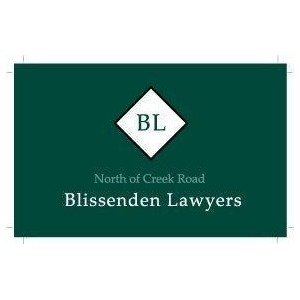Best Landlord & Tenant Lawyers in Moonah
Share your needs with us, get contacted by law firms.
Free. Takes 2 min.
Free Guide to Hiring a Real Estate Lawyer
List of the best lawyers in Moonah, Australia
About Landlord & Tenant Law in Moonah, Australia
Landlord and tenant law in Moonah, Australia is primarily governed by the Residential Tenancy Act 1997. The law sets out the rights and responsibilities of both landlords and tenants in residential accommodation matters. The key elements of this Act concern the agreement for lease, terms of lease, keeping pets, increase in rent, maintenance and repairs, and termination of lease, among others.
Why You May Need a Lawyer
There are several situations where legal representation may become necessary in landlord and tenant relationships. These scenarios may include disputes over the termination of lease agreements, allegations of agreement violation, evictions, disagreements over rent or bond issues, and matters concerning property damage or maintenance. Additionally, legal counsel may be required to ensure you are fully educated on your rights and responsibilities as outlined in the Residential Tenancy Act.
Local Laws Overview
Under Moonah’s local laws, a standard residential tenancy agreement should be written, and both the landlord and tenant should have a signed copy. Landlords are not allowed to increase rent more than once in a six-month span and are required to provide at least 60 days notice before any increase. Under the Act, both landlords and tenants carry specific duties for maintaining the property. The law also sets out clear guidelines on how and when an agreement may be ended, either under mutual agreement, due to breach of terms, or following a suitable notice period.
Frequently Asked Questions
1. What rights do tenants have in Moonah, Australia?
Tenants in Moonah have the right to live in a habitable rental property, to have their personal privacy respected, to have repairs done in a timely manner, and the right to be provided with a written lease among others.
2. What obligations do landlords have?
Landlords in Moonah are responsible for ensuring the property is fit for living, maintaining the property, providing a signed lease to the tenant, and respecting the tenant’s privacy.
3. Can landlords increase rent anytime they want?
No, landlords are not allowed to increase rent more than once in a six-month period and must give tenants at least 60 days notice beforehand.
4. What actions can tenants take if their rights were violated?
Tenants can contact the Residential Tenancy Commissioner or apply for a hearing before the Magistrates Court.
5. What happens if either party breaches the lease agreement?
If either party breaches the lease agreement, the other party may have grounds to end the lease prematurely, following the set guidelines under the Residential Tenancy Act.
Additional Resources
For further insights into your rights or obligations as a tenant or landlord, you can access information and advice from services like the Residential Tenancy Commissioner, Tenants' Union of Tasmania, or the Consumer Affairs and Fair Trading website.
Next Steps
If you require legal assistance in landlord & tenant matters in Moonah, it is suggested first to contact the Residential Tenancy Commissioner or a local legal advice service. If necessary, engage a lawyer who specializes in Landlord & Tenant law. Remember, any written correspondence with your landlord or tenant may be crucial in legal proceedings, so always keep track of these communications.
Lawzana helps you find the best lawyers and law firms in Moonah through a curated and pre-screened list of qualified legal professionals. Our platform offers rankings and detailed profiles of attorneys and law firms, allowing you to compare based on practice areas, including Landlord & Tenant, experience, and client feedback.
Each profile includes a description of the firm's areas of practice, client reviews, team members and partners, year of establishment, spoken languages, office locations, contact information, social media presence, and any published articles or resources. Most firms on our platform speak English and are experienced in both local and international legal matters.
Get a quote from top-rated law firms in Moonah, Australia — quickly, securely, and without unnecessary hassle.
Disclaimer:
The information provided on this page is for general informational purposes only and does not constitute legal advice. While we strive to ensure the accuracy and relevance of the content, legal information may change over time, and interpretations of the law can vary. You should always consult with a qualified legal professional for advice specific to your situation.
We disclaim all liability for actions taken or not taken based on the content of this page. If you believe any information is incorrect or outdated, please contact us, and we will review and update it where appropriate.








